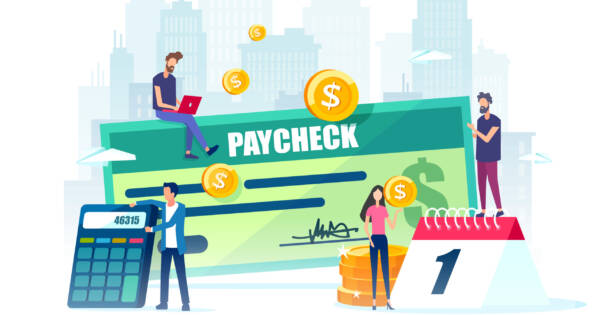What can put you both in the red and the black, financially speaking? Bills.
Yes, we mean those greenbacks you work for to afford things like housing, utilities, and groceries. But those same amenities cost you throughout the month. Dollar bills increase our financial wealth, while service bills decrease it.
It’s a fact of life. More importantly though, handling bills correctly — and we’re still talking both types — is crucial to financial success. Managing your money requires a learning curve, for sure. Luckily, we’re here to help you with one of the big questions you’ll face someday. Should you pay a large bill up front, in full? Or over time, in installments?
Dealing with Debt Requires a Strategy
There’s no concrete answer to this question. It will depend entirely on your own financial situation. What works for one person may not be wise for another. The best way to go about deciding how you should tackle debt is to first consider your present finances. Take a quick inventory of where you’re at with income, savings, and expenses — excluding the large bill before you.
Another way to look at things is to consider what benefits you’ll enjoy from each method. How can paying up-front or over time contribute to your financial success, both now and in the long-run? With that also comes a focus on the drawbacks of either path. Really, the balance comes in choosing a plan that will help you the most, while hurting you the least.
Paying Up-Front: One and Done
On paper, paying your debts in-full and up-front leads to the best financial outcome. You stamp out debt as soon as it appears and still manage to keep afloat. However, that’s simply not possible for many folks, and especially in these times. When your fridge dies suddenly or a surprise car repair bill hits, not everyone has the luxury of paying instantly.
Still, being able to pay your large debt entirely can sound like an achievement. You won’t be sacrificing money to interest charges and the amount you are billed is the exact amount you’ll be charged. The stress of having a monthly payment will be removed from your shoulders. Your future money will be freed up to do with as you please.
All this comes with the caveat that you have the full amount to pay the large bill before you. In some cases, that’s not even possible. If you can’t pay in full because you simply don’t have the cash, your choice has been made for you. It’s best to choose a monthly payment method instead.
Maybe your situation is somewhere between those two extremes. You could pay that large bill up front, but it should severely tighten your finances for a few months. We’re talking peanuts and breadcrumbs for every meal — no minor setback. That creates a whole new stress. With barely any savings to your name, the choice is clear. Little by little beats one large chunk, at least in your case.
Monthly Installments: Slow and Steady Pays the Debt
So why would it be better to pay monthly?
For starters, even if you were to get a loan to pay off the bill amount in full, you’d still have that monthly loan payment to contend with. Ideally, you’d choose a loan with lower interest charges than the bill you received. But what if that wasn’t possible? You might end up paying more. Plus you’ll have to deal with managing the loan on top of it all.
The best way to categorize payments on a large bill is to think of them as a recurring monthly bill, like your utilities. For example, you (should) budget for things like housing, food, and utilities each month. You might have a car payment on top of that, in addition to gym memberships, media subscriptions, and anything else you pay monthly for. If you can think of the bill payment as just another monthly service, it’s a much easier amount to tackle.
Benefits to paying through installments occur on your credit report as well. Forbes reports that your payment history makes up 35% percent of your credit score. It’s not about whether or not you can afford to pay large debts, but whether you can manage them over time and in a financially responsible manner. Each on-time payment contributes to the good payment history you build each month.
Cold Hard Cash: Snowball and Avalanche Methods
Financial experts have even created nicknames for the strategies you can implement to pay off large debts that come with a monthly payment. The first is called the snowball method. It begins small but with large rewards. Rank your debts from smallest to largest. Commit the minimum balance to each, while using as much remaining income to pay off the smallest debt first. When that smallest debt is eliminated, move on to the next smallest. Continue this method until each of your debts is paid off.
In contrast, the avalanche method works to pay off the debt with the highest interest rate first. It may not work as quickly as the snowball method, but you are controlling the interest you’ll be charged by facing it directly. If you do the math, you probably save money in the long run with the avalanche method.
Depending on your financial situation and debts in total, sometimes a combination of these methods works the best. Small debts can be paid off quickly while those with the highest interest rate become a priority. It’s all in how you manage your finances.
Focus on Your Finances
If you’re still wondering what the best path for you is, take a look at the following questions. As you answer them, a choice should make itself clear.
- Do you currently have the money in-hand (or in the bank) to pay off the large bill now?
- Will paying off the bill in full now put you below your financial safety net (in other words, an amount you’re comfortable with having in case of emergency)?
- What income will you have in the coming weeks and/or months?
- What expenses will you have in the coming weeks and/or months?
- How much would you save in interest by paying in full now?
- Which makes you feel more financially secure — avoiding interest charges or sacrificing a small sum to keep your financial safety net secure?
The important thing to remember is that both scenarios keep your credit intact, as long as you make your monthly payments. Much like credit cards, mortgage payments, and car loans, long-term payments boost your credibility with debtors. Paying debts off in full as you get them comes with a certain financial confidence as well. As long as you’ve got a plan in place, financial stability and success are just a matter of time.
Invest in Your Financial Success
If you’d like to learn more about debt and how to approach it, check out this article on debt relief vs. debt consolidation. You can find out more about budgeting here. We always encourage savvy readers to remember these common myths about credit scores. Your financial success is attainable, and we are here to support you. Stay tuned for tips, guides, and plenty more to put you on the path to financial freedom.
The Last Word
No one likes being hit with a large, unexpected bill. Many Americans simply whip out the credit card and think “I’ll worry about this later.” After all, your family can’t live without a working furnace in the middle of winter. Or you absolutely need a working vehicle to get your job every day. So you bite the bullet, and pay the bill — one way or another.
The factor you really need to consider is “what is the true cost of my decision?” For example, paying in installments might ease your monthly budget but dramatically jack up the cost of your bill. Predatory interest rates could mean your $3,000 medical bill ends up costing you over $5,000 by the time you make 24 monthly payments.
On the other hand, if paying that $3,000 up front means your family is living off ramen noodles for the next six months, that’s not great either. While your specific financial situation will always help guide you towards one answer or the other, make sure you consider all the angles the next time you’re hit with an unexpected large bill.
 Shutterstock
Shutterstock







